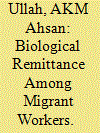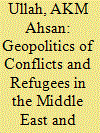| Srl | Item |
| 1 |
ID:
161622


|
|
|
|
|
| Summary/Abstract |
The huge amount of remittance transfers has brought migration studies to the fore in the public and private discourse on global development. Since the time migration studies occupied a space in the academe, most research has been devoted to remittances in cash and their use. Prior to the mid-nineties, the debate about the concept of migrants’ ‘remittance’ has not entailed other forms of remittances other than remittances in cash. This research explores another form of remittance, that is, biological remittance. This research firstly explores how migrant populations handle ‘biological remittance’ in their societies, and secondly compares the experiences of female migrant workers in two countries with distinct cultural and religious mores. We collected empirical information from two countries: Indonesia and the Philippines. A total of 38 respondents (17 from the Philippines and 21 from Indonesia) were selected for this study by using the snowball technique. While all the respondents, irrespective of countries of origin, face ordeals coping with their situation, Indonesians bear more psychological burden than the Filipinos. This research has crucial implications for scholars, researchers and policy-makers alike.
|
|
|
|
|
|
|
|
|
|
|
|
|
|
|
|
| 2 |
ID:
095943


|
|
|
| 3 |
ID:
160487


|
|
|
|
|
| Summary/Abstract |
Geopolitically intertwined and strategically significant refugee policy in the MENA region is frequently analyzed in light of well-documented ethnic, religious, class, and border conflicts. However, the policy is also inexorably linked to the broader geopolitics of the global refugee protection regime and discourse. This article analyzes the complex relationship between geopolitics, domestic political dynamics, and their attendant crises in the MENA region. The complex set of political shockwaves of the Arab Spring induced massive mobility of people which may compound incipient political tensions between and within MENA states.
|
|
|
|
|
|
|
|
|
|
|
|
|
|
|
|
| 4 |
ID:
183689


|
|
|
|
|
| Summary/Abstract |
The circumstances prevailing in South Asia (SA) have led to a plateauing migration stream that has resulted in several categories of migrants. The underlying factors driving migration have been identical in all the countries of SA. In recent years, however, poverty, conflicts, political and religious persecution, natural disasters and climate change have emerged as the most prominent drivers. External migration flow from SA has more than doubled between 2000 and 2015. This is a dynamic region, with millions (over 38m in 2017) of people crossing borders, both intra-regionally and extra-regionally. In recent years, wealthy citizens from SA have begun to move out of their countries with the intention of settling down elsewhere. This tendency has raised concerns among the policy makers because they create the grounds for reverse remittance flows. This research is meant to identify and contribute to the discourse of a new category of migrants (non-conventional migration) who are different from those in the conventional migration stream that included economic and forced migration. This research has crucial policy implications for both origin and destination countries.
|
|
|
|
|
|
|
|
|
|
|
|
|
|
|
|